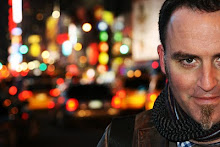My only other issue with the series is that all the modern figures who are interviewed as examples of bohemians (John Cooper-Clarke, Maggie Tamlin, Stephen Fry, Grayson Perry) are extremely rich, well-known figures in the arts, who, as a result of being famous, in my view can't possibly be bohemians. They may have been bohemians once, but I actually think the concept of bohemianism is compromised by wealth.
Actually, I'd be much more interested in seeing an ancient artist living in a council house who's worked all their life as a painter but actually hasn't sold quite enough paintings to adequately feed herself and doesn't know what will happen when she gets ill or dies. Poverty and bohemianism are inextricably bound. Of course all these famous figures claim that bohemianism is no longer alive because "we all have permissive values these days." I would argue that they make these claims exactly because they are no longer a part of the sub-culture which once defined them.
As you might expect, Reverend Richard Coles popped up to talk about his seedy/ heady/ political lifestyle as a member of the Communards and his subsequent embroilment in the Anglican Church. There's no doubt he's a fascinating character worthy of inclusion in the film, but Coren Mitchell described him as the vicar of a church in Finedon "near Peterborough." Finedon is actually just a few miles up the A6 from Higham Ferrers where I grew up. Unlike Peterborough, it's in the county of Northamptonshire, far closer to places like Wellingborough, Kettering and Corby. Saying it's near Peterborough for me is almost as ludicrous as the town of Bedford having a Milton Keynes post code!
Anyway, aside from these tiny, and profoundly irrational niggles, the series is wonderful. I'm not sure you can catch it on iplayer at the moment, but when it's repeated, watch it with joy-filled alacrity, if that's not a tautology!
The programme ended with a discussion about hipsters. I've always rather hated the term, and indeed the people who identify themselves thus. I'd never associated hipsters with bohemians but it seems most people consider them to be modern day incarnations of boho folk. Someone in the film was totally on the money by describing hipsters as people who simply try to look like bohemians without any of the bother. As A A Gill opined, "I'm never convinced that facial hair is ever a substitute for thought!"

No comments:
Post a Comment
Note: only a member of this blog may post a comment.